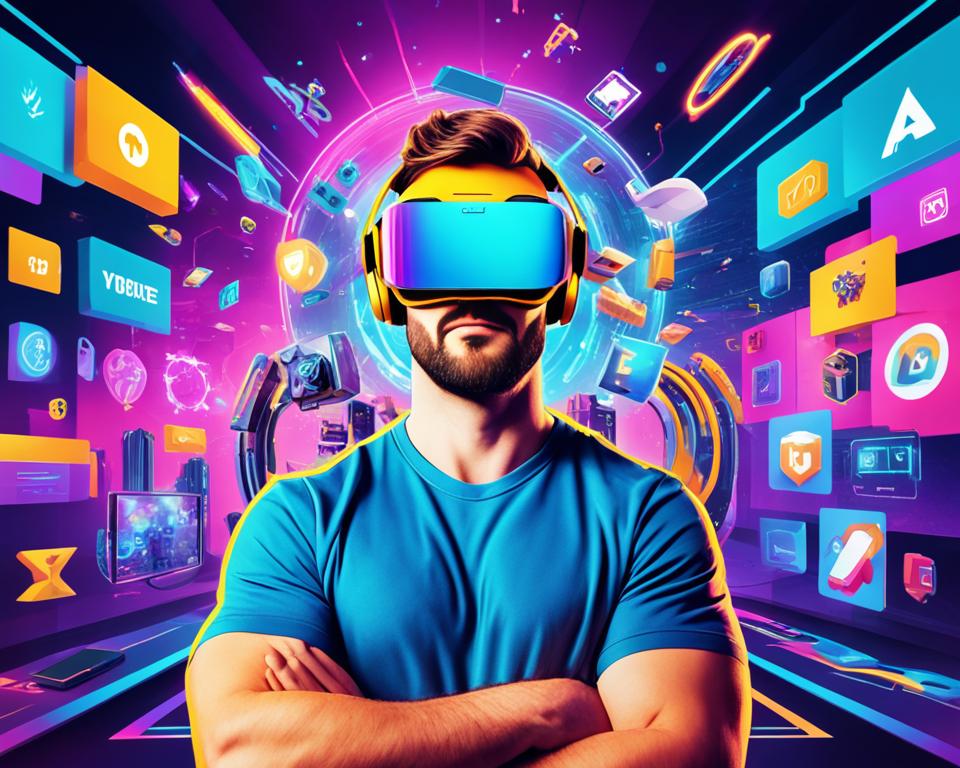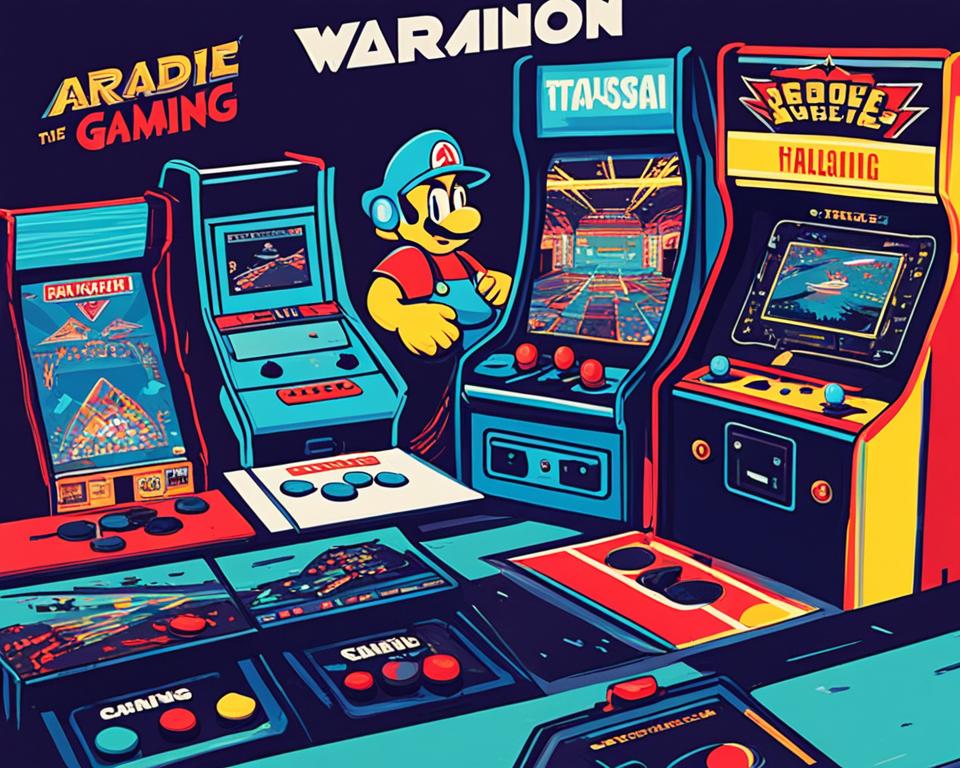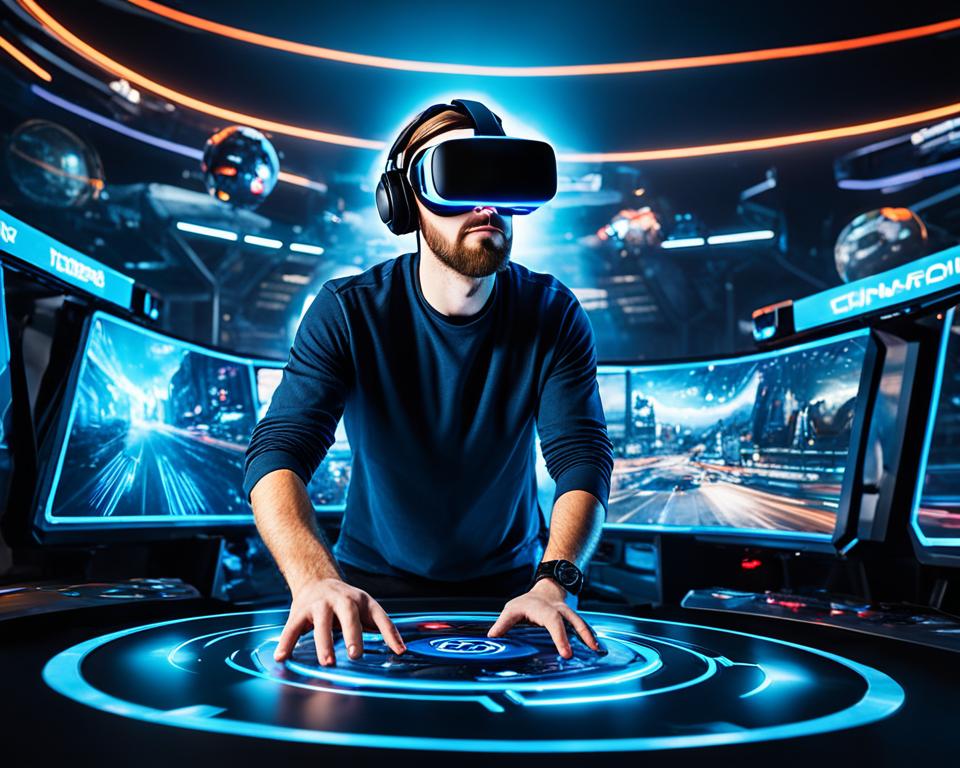Welcome to the exclusive world of private gaming clubs, where gaming enthusiasts come together to experience gaming on a whole new level. These clubs offer a luxurious and high-end environment for members to indulge in their passion for gaming. Located in major cities, private gaming clubs provide an escape from the ordinary and allow gamers to immerse themselves in an extraordinary gaming experience.
Membership to these clubs is highly sought after and limited, ensuring that members have access to the best gaming equipment, exclusive tournaments, and a vibrant gaming community. With the rise of gaming culture, private gaming clubs in the UK, such as The Ritz Club and The Clermont Club, have become popular destinations for those seeking a premium gaming experience.
These clubs offer a range of amenities, including private gaming rooms, VIP lounges, and personalized service. The exclusive nature of private gaming clubs creates an atmosphere of prestige and luxury, attracting high-profile individuals and celebrities who are passionate about gaming. In addition to world-class gaming facilities, members also enjoy access to exclusive gaming events, networking opportunities, and personalized gaming concierge services.
Private gaming clubs have become synonymous with luxury and exclusivity in the gaming world. They provide a space where gamers can connect, compete, and share their love for gaming with like-minded individuals. With their attention to detail and dedication to providing the ultimate gaming experience, private gaming clubs continue to redefine what it means to be a part of the gaming community.
Key Takeaways:
- Private gaming clubs offer an exclusive and luxurious gaming experience.
- Membership to these clubs is highly sought after and limited.
- Top gaming clubs in the UK include The Ritz Club and The Clermont Club.
- Private gaming clubs provide amenities such as private gaming rooms and VIP lounges.
- Members enjoy access to exclusive events, networking opportunities, and personalized services.
The Pioneering Role of Gaming Companies in the Metaverse
Gaming companies have taken on a pioneering role in the development and exploration of the metaverse. The metaverse refers to a collective virtual shared space, created by the convergence of virtually enhanced physical reality and physically persistent virtual reality. It is a digital universe where users can interact with each other and participate in various activities, including gaming, socializing, and conducting business.
Understanding the Metaverse: Perspectives from Gaming Executives
Gaming executives have recognized the immense potential of the metaverse and its impact on the gaming industry. They understand that the metaverse offers a new frontier for immersive and interactive experiences, blending virtual realities with the real world. Gaming companies play a crucial role in shaping and defining the metaverse, leveraging their expertise in game development, technological innovation, and user engagement.
Building Virtual Realities: The Emergence of a Digital Universe
Gaming companies have been at the forefront of building virtual realities within the metaverse. They utilize cutting-edge technology, such as virtual reality (VR) and augmented reality (AR), to create immersive gaming environments that blur the line between fantasy and reality. By developing lifelike simulations, gaming companies offer players the opportunity to explore new worlds, engage in thrilling adventures, and connect with fellow gamers on a global scale.
Social Gaming and Community Building in Virtual Worlds
One of the key aspects of the metaverse is its focus on social gaming and community building. Gaming companies recognize the value of fostering a strong and vibrant gaming community within virtual worlds. They provide platforms for players to connect, collaborate, and compete, enabling social interactions and meaningful relationships to flourish. By emphasizing social gaming, gaming companies enhance the overall gaming experience and create a sense of belonging for their players.
Investing in the Future: Gaming Industry’s Move into Augmented Realities
In addition to virtual realities, gaming companies are also venturing into augmented realities within the metaverse. Augmented reality overlays digital content onto the real world, enhancing the players’ perception of their surroundings. With the advent of technologies like mixed reality headsets and mobile AR, gaming companies are exploring new ways to blend digital elements with the physical environment, creating unique and interactive gaming experiences.
| Gaming Companies | The Metaverse | Virtual Realities | Digital Universe | Social Gaming | Augmented Realities |
|---|---|---|---|---|---|
| Electronic Arts | ✓ | ✓ | ✓ | ✓ | ✓ |
| Activision Blizzard | ✓ | ✓ | ✓ | ✓ | ✓ |
| Ubisoft | ✓ | ✓ | ✓ | ✓ | ✓ |
| Square Enix | ✓ | ✓ | ✓ | ✓ | ✓ |
Gaming Industry Trends: A Look into NFTs and Digital Ownership
The gaming industry is currently experiencing significant trends that are shaping its future. One particular trend that has gained prominence is the adoption of non-fungible tokens (NFTs) and the concept of digital ownership. NFTs are unique digital assets that are stored on a blockchain, ensuring their verifiable scarcity and security.
With the rise of blockchain technology, NFTs have become a game-changer in the gaming industry. These tokens have opened up a world of possibilities for players, allowing them to own and trade virtual assets such as in-game items, characters, and skins. Players can now truly be in control of their virtual possessions, giving them a sense of digital ownership like never before.
The introduction of NFTs has revolutionized the concept of virtual assets. In the past, players would acquire in-game items that held no real-world value once the game ended. However, NFTs have brought value and scarcity to these virtual assets, making them tradable commodities with real-world implications.
This trend has paved the way for virtual asset marketplaces, where players can buy, sell, and trade their digital possessions. These marketplaces operate on decentralized platforms, further leveraging the power of blockchain technology to ensure transparency, security, and trust.
NFTs and digital ownership have not only impacted players but also game developers and publishers. They have provided new avenues for monetization, allowing developers to sell limited edition items, offer exclusive content, and create revenue streams beyond the traditional model of game sales and in-game purchases.
The gaming industry’s embrace of NFTs and digital ownership is a testament to its forward-thinking nature. It recognizes the importance of embracing new technologies and trends to provide innovative and immersive experiences for players.
With NFTs and digital ownership, the gaming industry is at the forefront of a paradigm shift that blurs the lines between virtual and physical worlds. The concept of owning digital assets is evolving, creating new possibilities and opportunities for players, developers, and the industry as a whole.

| Trend | Description |
|---|---|
| NFTs | Unique digital assets stored on a blockchain, allowing players to own and trade virtual items. |
| Digital Ownership | The concept of owning digital assets, providing players with a sense of control and value. |
| Blockchain Technology | A decentralized and transparent system that facilitates the secure storage and verification of digital assets. |
| Virtual Assets | In-game items, characters, and skins that hold real-world value and can be traded on virtual asset marketplaces. |
| In-Game Items | Virtual items acquired within a game, often used to enhance gameplay or customize characters. |
The Behavioral Shifts and Business Models Shaping the Gaming Market
The gaming market is currently undergoing significant behavioral shifts and witnessing the emergence of innovative business models that are shaping its future. These developments present both new opportunities and challenges for gaming companies.
New Business Opportunities within the Metaverse
As the metaverse continues to gain momentum, it opens up a whole new realm of business opportunities for the gaming industry. The metaverse offers a digital universe where users can interact, socialize, and engage in various activities, including gaming. By leveraging the metaverse, gaming companies can create immersive and interconnected virtual worlds that attract a global audience and facilitate unique gaming experiences. This presents an opportunity for companies to monetize their offerings through in-world transactions, virtual real estate, and digital goods.
Furthermore, the metaverse provides a platform for gaming companies to collaborate with other industries and explore new avenues for growth. By partnering with brands from different sectors, gaming companies can create cross-promotional opportunities and tap into diverse customer bases. This interconnectedness within the metaverse offers endless possibilities for expansion and revenue generation.
Constructing Strong Brand-Customer Relationships through Gaming
Gaming has become a powerful tool for constructing and nurturing brand-customer relationships. Through innovative marketing strategies and immersive gaming experiences, companies can forge deep connections with their target audience. By integrating their brands into digital worlds, gaming companies can deliver personalized and interactive experiences that resonate with players on a deeper level.
Additionally, establishing a community-driven approach within gaming platforms can foster a sense of belonging and loyalty among players. By creating spaces for gamers to connect, share experiences, and participate in collaborative activities, companies can cultivate a strong community that supports their brand. This community-centric approach not only enhances brand-customer relationships but also provides valuable insights and feedback for continuous improvement.
Rethinking Product and Talent Investments in Gaming
The evolving gaming landscape necessitates a reevaluation of product and talent investments. Companies must adapt to changing consumer preferences and focus on developing products and services that align with emerging trends. This may involve investing in technologies such as virtual reality (VR), augmented reality (AR), and cloud gaming to enhance the gaming experience and cater to the growing demand for immersive gameplay.
Moreover, talent investments play a crucial role in driving innovation and staying competitive in the gaming market. Companies need to attract and retain top talent with expertise in emerging technologies, game design, and community management. By harnessing the skills and creativity of talented individuals, companies can develop groundbreaking games, foster engaging communities, and differentiate themselves in a crowded market.
In conclusion, the behavioral shifts and evolving business models in the gaming market are transforming the industry’s landscape. The metaverse offers new and exciting business opportunities, while constructing strong brand-customer relationships through gaming is becoming increasingly important. Additionally, rethinking product and talent investments is essential for sustainable growth and innovation in this dynamic market.
Monetization Strategies of Contemporary Gaming: The Role of NFTs
Contemporary gaming has evolved beyond traditional revenue models, and game developers are exploring new ways to monetize their products. One of the key strategies gaining traction is the use of non-fungible tokens (NFTs) and digital assets. NFTs are unique, verifiable digital items that can be bought, sold, and traded on blockchain platforms. They have opened up new avenues for gamers to acquire and possess virtual goods that hold real-world value.
NFTs have revolutionized the concept of in-game purchases by providing players with ownership and control over their virtual assets. Instead of buying temporary or disposable items, gamers can invest in unique digital items that retain their value over time. This creates a sense of exclusivity and scarcity, making these assets highly desirable among collectors and gaming enthusiasts.
Virtual economies within games have also seen significant growth and development with the introduction of NFTs. Players can now participate in player-driven marketplaces where they can buy, sell, and trade digital assets directly with each other. This decentralized approach empowers players, giving them the opportunity to monetize their gaming skills and creativity.
Furthermore, NFTs provide a new revenue stream for game developers. By creating and selling limited-edition digital items, developers can generate additional income and support ongoing game development. In some cases, NFT sales have even surpassed traditional game sales, highlighting the potential and popularity of this monetization strategy.
However, the use of NFTs in gaming is not without controversy. Critics argue that the high transaction costs and environmental impact of blockchain technology pose challenges and ethical concerns. Additionally, the speculative nature of NFT investments raises questions about the long-term stability and value of these digital assets.
In conclusion, the integration of NFTs into contemporary gaming has introduced innovative monetization strategies and opportunities for players and developers alike. As the gaming industry continues to evolve, it will be interesting to see how NFTs shape the future of virtual economies and digital ownership within games.

The Challenges and Skepticism Surrounding NFTs in the Gaming Industry
The adoption of non-fungible tokens (NFTs) in the gaming industry has posed several challenges and faced skepticism. While NFTs offer the potential to enhance the gaming experience and create new revenue streams, there are important considerations to address.
Viability of Digital Assets in Current Gaming Business Models
An essential aspect of integrating NFTs into the gaming industry is the viability of digital assets within current business models. This includes exploring how these assets can be seamlessly incorporated into gameplay mechanics without detracting from the overall gaming experience.
Moreover, game developers and publishers must carefully consider the impact of NFTs on the player base. Balancing the introduction of digital assets with fair and accessible gameplay is crucial to maintain a positive user experience and prevent a perception of pay-to-win scenarios.
Examining the Long-Term Value Proposition of NFTs
Another challenge surrounding NFTs in the gaming industry is evaluating their long-term value proposition. While the initial hype surrounding NFTs may drive initial adoption, sustainability and longevity are critical for their continued success.
This involves assessing the long-term demand for digital assets, potential market saturation, and the ability to maintain value over time. Building a robust ecosystem that supports the ongoing development and trading of NFTs is essential for ensuring their relevance and value within the gaming industry.
The Balancing Act: Hype vs. Stability of Digital Assets
One of the main concerns surrounding NFTs in the gaming industry is striking a balance between the hype surrounding these digital assets and their stability. The explosive growth and speculative nature of the NFT market pose risks for both developers and players.
Developers must navigate the challenge of managing player expectations and ensuring that digital assets provide value beyond mere speculative investment. Players, on the other hand, need assurances that their investments in NFTs will remain stable and not result in financial losses.
By addressing these challenges and skepticism surrounding NFTs, the gaming industry can unlock the full potential of these digital assets while maintaining a sustainable and enjoyable gaming experience for players.
Exclusive Insights: How Gaming is Evolving as Media Entertainment
The evolution of gaming as a form of media entertainment has been nothing short of remarkable. With the advent of live streaming platforms, esports competitions, and the metaverse, gaming has captured the attention of a diverse and expansive audience. It has transcended its origins as a recreational activity to become a significant cultural phenomenon.
One of the key factors driving the growth of gaming as entertainment is the rise of live streaming platforms. Platforms like Twitch and YouTube Gaming have revolutionized the way people consume gaming content. Gamers can now showcase their skills, interact with their audience, and build dedicated communities around their favorite games. This has opened up new opportunities for content creators and has created a whole new ecosystem within the gaming industry.
Esports competitions have also played a crucial role in the evolution of gaming as media entertainment. These competitive events bring together the best players in the world to compete for fame, glory, and substantial prize pools. Esports events now attract millions of viewers globally, with dedicated fan bases and passionate communities forming around specific games. The growth of esports has not only elevated gaming to the level of traditional sports but has also created new avenues for sponsorship, advertising, and revenue generation.
Another groundbreaking development in gaming as entertainment is the emergence of the metaverse. The metaverse is a virtual reality space where users can interact with each other and engage in various activities, including gaming. It offers a new level of immersion and social interaction, allowing gamers to create and explore virtual worlds. Companies like Roblox and Fortnite have spearheaded this movement, providing platforms for users to create their own experiences within the metaverse. The metaverse has the potential to reshape the way we play, socialize, and consume entertainment, further blurring the lines between gaming and traditional media.
The astounding growth of the gaming industry as a whole is a testament to its evolution as media entertainment. The industry has experienced exponential growth in recent years, with revenues surpassing those of the film and music industries combined. This growth can be attributed to factors such as the increasing accessibility of gaming devices, the rise of mobile gaming, and the expansion of gaming markets worldwide.
In conclusion, gaming has transformed from a recreational activity into a prominent form of media entertainment. Through live streaming platforms, esports competitions, and the metaverse, gaming has captivated a wide audience and positioned itself as a leading industry in the entertainment sector. As technology continues to advance and new innovations arise, the evolution of gaming as media entertainment will undoubtedly continue, driving further growth and captivating audiences around the world.

Gaming IP and the Quest for New Audiences: Global and Middle East Perspectives
Gaming intellectual properties (IP) have played a significant role in the global media sector’s growth and the quest for new audiences. The popularity of gaming IPs, such as video game franchises, has extended beyond the gaming industry and into other forms of media entertainment.
These gaming intellectual properties have become valuable assets, capturing the attention of both gamers and non-gamers alike. They have the power to generate substantial revenue and create immersive experiences that engage audiences on a global scale.
One of the key drivers of this phenomenon is the rise of mobile gaming. With the widespread adoption of smartphones and tablets, gaming has become more accessible than ever before. Mobile gaming has not only expanded the gaming audience but has also provided a platform for gaming IPs to reach new markets and demographics.
Gaming platforms, such as app stores and social media platforms, have also played a crucial role in the dissemination of gaming IPs. These platforms provide developers with a global stage to showcase their IPs and connect with audiences worldwide. Through strategic partnerships and licensing agreements, gaming IPs can be integrated into various forms of media, including movies, television shows, merchandise, and more.
The Middle East is one region that has seen a significant boom in gaming IP adoption and growth. The region’s vibrant and diverse gaming community, coupled with government support and investment, has contributed to the rise of gaming IPs as a cultural phenomenon. In recent years, the Middle East has seen the emergence of talented game developers and content creators who are creating unique and captivating gaming IPs that resonate with global audiences.
The integration of gaming IPs into the global media sector has not only expanded the reach of these IPs but has also created new opportunities for cross-collaboration and innovation. As gaming continues to evolve as a form of entertainment, the strategic adoption and utilization of proven gaming intellectual properties will play a vital role in driving the growth of the gaming industry and captivating new audiences.
Microsoft’s Vision for the Future of Gaming: An Integrated Approach
Microsoft has a clear vision for the future of gaming, and it revolves around an integrated approach that encompasses hardware, content, and infrastructure. The tech giant recognizes the immense potential of the gaming industry and sees it as a key pillar of its business strategy. As a result, Microsoft is making substantial investments in gaming technology and platforms to shape the future of gaming.
One of the core elements of Microsoft’s vision is the development of cutting-edge gaming technology. The company is focused on pushing the boundaries of what is possible in terms of graphics, performance, and immersive experiences. By leveraging advanced hardware technologies, such as the powerful Xbox Series X console, Microsoft aims to deliver the highest quality gaming experiences to players around the world.
In addition to hardware, Microsoft is also committed to creating a robust ecosystem of content. The company is investing in exclusive game titles, partnerships with top developers, and the expansion of its gaming portfolio. This ensures that players have access to a diverse range of games that cater to their interests and preferences.
Furthermore, Microsoft’s integrated approach extends beyond individual gaming experiences. The company is focused on building a seamless ecosystem that connects players across different platforms. Whether it’s console gaming, PC gaming, or mobile gaming, Microsoft aims to provide a cohesive experience that allows players to connect, compete, and collaborate with each other effortlessly.
To support this integrated approach, Microsoft is also investing in cloud infrastructure and services. The company’s cloud gaming platform, Xbox Cloud Gaming (formerly known as Project xCloud), enables players to access their favorite games on various devices. This cloud-based approach not only enhances accessibility but also opens up new possibilities for cross-platform play, game streaming, and on-demand gaming experiences.
As Microsoft continues to shape the future of gaming, its integrated approach will play a crucial role in driving innovation and delivering immersive gaming experiences to players worldwide. By leveraging its expertise in hardware, content, infrastructure, and cloud technologies, Microsoft is well-positioned to lead the way in the ever-evolving gaming industry.

The Middle East’s Ascent as a Gaming Powerhouse
The gaming industry in the Middle East has experienced a remarkable rise in recent years, positioning the region as a significant gaming powerhouse on the global stage. With a growing population of avid gamers and an increasing emphasis on technological advancements, the Middle East has become a hotbed for gaming penetration and innovation.
Regional Gaming Penetration and the Rise of Game Streaming
Gaming penetration in the Middle East has reached new heights, with a surge in the number of gamers across the region. The accessibility of smartphones and high-speed internet connections has contributed to this growth, allowing gamers to connect and engage in online gaming communities.
Furthermore, game streaming has gained immense popularity in the Middle East, with platforms like Twitch and YouTube Gaming attracting a large and dedicated audience. Gamers in the region have embraced streaming as a means to showcase their skills, connect with fellow gamers, and entertain viewers. The rise of game streaming has not only elevated the status of gaming in the Middle East but has also provided new opportunities for content creators, streamers, and esports professionals.
Government Investment and Commitment to Gaming and Esports
The Middle East has recognized the economic and cultural significance of the gaming industry and has made substantial investments to support its growth. Governments in the region have been proactive in establishing gaming infrastructure, funding esports initiatives, and hosting international gaming events.
This level of government investment has created a fertile ground for local talent to thrive and has attracted international gaming companies to establish a presence in the Middle East. Additionally, the commitment to gaming and esports has fostered a vibrant gaming ecosystem, with the development of gaming hubs, universities offering specialized gaming programs, and the organization of national and regional gaming tournaments.
Strategic Positioning: The Middle East at the Crossroads of Gaming Markets
The Middle East’s strategic positioning between Europe, Asia, and Africa has provided a unique advantage in the global gaming market. The region serves as a bridge between different gaming markets, making it an attractive destination for international collaborations, partnerships, and investments.
Furthermore, the Middle East’s rich cultural heritage and its potential as a tourism hub have paved the way for gaming companies to capitalize on the growing interest in gaming-related entertainment and experiences. With forward-thinking initiatives and a commitment to innovation, the Middle East has successfully positioned itself as a key player in the global gaming market.
In conclusion, the Middle East’s ascent as a gaming powerhouse is a testament to the region’s rapid growth, government support, and strategic positioning. The Middle East’s gaming penetration, rise of game streaming, government investment, and market positioning have propelled the region to the forefront of the gaming industry, securing its status as an influential player in the global gaming landscape.
Conclusion
The gaming industry is at the forefront of innovation and evolution, with significant transformations shaping its future. One of the most exciting trends is the rise of the metaverse, a digital universe where gamers can interact and participate in various activities. This immersive experience not only brings gamers closer together but also opens up new possibilities for socializing, conducting business, and even creating virtual economies.
Another trend that is revolutionizing the gaming industry is the adoption of non-fungible tokens (NFTs) and digital ownership. NFTs allow gamers to own and trade unique virtual assets, creating new revenue streams and enhancing the gaming experience. With the verifiability and scarcity offered by blockchain technology, NFTs have the potential to transform how gamers engage with in-game items and virtual economies.
Furthermore, gaming has transcended its role as a recreational activity and has become a significant form of media entertainment. With the rise of live streaming platforms and esports competitions, the gaming industry has experienced tremendous growth and attracted a wide audience. This evolution has led to strategic partnerships between gaming companies and other entertainment sectors, further blurring the lines between gaming and traditional media.
As the future of gaming unfolds, it is clear that the industry will continue to push boundaries and explore new frontiers. From the integration of gaming into the metaverse to the strategic adoption of proven gaming intellectual properties, the gaming industry is poised for continued growth and innovation. Exciting times lie ahead for gamers, as the industry continues to shape the future of entertainment.
